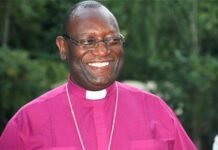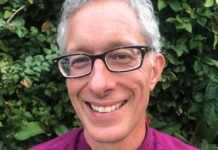While drinking his morning coffee yesterday, Anatoliy Raychynets looked out his Kyiv apartment window and discovered a nearby aeroplane factory had been encircled with military tanks for protection while he slept. A couple of hours later, Raychynets was seated in his office, a massive smile across his face and joy evidently spilling over via Zoom in an interview with Eternity.
Raychynets is the Deputy General Secretary of Ukraine’s Bible Society. And, remarkably, he actually does have a reason to smile at the moment, even as the threat of war increases by the minute.
That is not to say Raychynets is in denial or naive about what is unfolding around him.
“We just see all those really horrible sides of war where you have a lot of lies to make a provocation to run a policy which is dirty – which doesn’t take into account human lives,” he says.
The reality is that Ukraine’s situation looks bleak. Russia appears to have been establishing a pretext to invade the country for years and, barring a miracle, full-scale war seems imminent.
On Monday night, Russian troops crossed into two key regions in Eastern Ukraine, the self-proclaimed Donetsk and Luhansk People’s Republics. Russian President Vladimir Putin claims the troops are “peacekeepers” needed to protect Russian-speaking Ukrainians from Ukrainian forces – a claim roundly dismissed as false by world leaders.
But while Putin may not be winning the propaganda war globally, his real audience is Russians and Russian-speaking Ukrainians – and his message appears to be resounding much better with them.
For example, last week, state-owned Russian media began reporting Ukrainian terrorist attacks targeting Moscow-backed leaders in Donetsk and Luhansk. The reports spread on social media channels among loyalists, fuelled by months of Russian state media reports alleging citizens in the two regions are suffering.
The details later proved to be false – a video of a pipe bomb from another incident in July last year was used and a the car that was bombed did not belong to the separatist leader media claimed it did.
Yet within hours, leaders in both regions had announced all women and children needed to be urgently evacuated to Russia. Convinced, many Ukrainians in the area obeyed and went over the border.
Pastors and chaplains on the ground in separatist regions
“We don’t need any more to discuss what’s going on. We know what’s going on,” Raychynets says.
“We have pastors who are serving inside Donetsk and Luhansk, so we don’t take information from the news but from conversation with them.”
Those reports include the experiences of Ukrainians who fled into Russia and who are sending messages and videos back to their pastors– some saying they hadn’t eaten for over 24 hours.
“We have pastors who are serving inside Donetsk and Luhansk, so we don’t take information from the news but from conversation with them.”
These pastors in Donetsk and Luhansk have been ministering in a warzone for years. Both “republics” are located in the Donbas region where troops have been fighting Kyiv-led forces since Russia’s annexation of Crimea in 2014. Approximately one-third of the regions are currently controlled by these separatist forces who are friendly with Moscow.
But now the escalation of Russia’s claim to the region has dispersed the congregations they minister to.
Raychynets is also in touch with military chaplains working in the east and received an update from them earlier in the morning.
“It was a really hard night, again,” he reports. “Several Ukrainian soldiers killed. Now, every day, we have new statistics of so many killed, so many hurt.”
“Maybe the majority think ‘it’s just a statistic’ but through our Bible Society projects we have touched several orphans who have lost their parents in war. So you understand it’s not only a statistic for them. It’s their whole world, when they lose a beloved.”
Residents of Kyiv are also on high alert, with western intelligence indicating Russian forces plan to attack in the coming days.
The city is not only the nation’s capital but also where many Ukrainians who have fled from the east in recent years have settled. It’s also Raychynets’ home.
“We have information that the enemy will make some provocation here inside Kyiv – a terrorist [attack], actually. An explosion in a subway or something like that to start, [so their attack does] not to come from outside, but to start from inside in capital. So this is the current situation,” he explains.
“We printed Bibles for 2022 and we are now in second month of the year and the stock in our warehouse is almost gone.”
Holy work – ministering to “people who have tears and fears”
So how does a Christian pastor minister to people at this time?
Raychynets says that, as is often the case in challenging times, people in Ukraine are more open to the gospel than ever. Churches are filled with people wanting to pray, receive comfort and find community. The Bible Society is taking phone calls and drop-ins of people seeking wisdom and desperate to get Bibles.
“We printed Bibles for 2022 and we are now in second month of the year and the stock in our warehouse is almost gone. This is a big challenge! We are talking about what we can do and how we can print more Bibles because people are asking for whatever we have,” he says.
“It’s a really good opportunity to ask people what is real, what the main priority in our life is, because circumstances push people to think about more than only their material, daily life,” Raychynets says.
“In our churches – whether it is Orthodox, Catholic, Protestant, or Evangelical churches – there are more new people. Not only on Sundays or Saturdays, but also during the week. On evenings when we have a Bible study, new people are coming. They want to pray, to hear something that brings hope or comfort,” Raychynets says.
Christians from different denominations have united together for prayer, gathering in some of the city’s largest cathedrals. An evangelical service last week drew more than 1000 attendees and a further 45,000 who watched on YouTube.
Raychynets has even been involved in an interfaith prayer meeting with Jews and Muslims who are all part of a church and religious organisation council he serves on.
“When you have church leaders for Orthodox, Catholic, Protestant, Evangelical churches altogether, and then you have Muslims and you have Jews… well, it’s interesting to see how the situation unites us, with us standing in front of God asking for the same prayer.”
The juxtaposition of feeling both anxious about the threat of a war and joyful over Ukrainians opening their hearts to God is, understandably, a strange experience.
“I call it mixed feelings,” Raychynets says.
“Of course, to be honest, everybody here in office, all our team and our offices around in Ukraine, and I myself, feel uncomfortable. Now you don’t watch the news only in the evening, you are reading every hour what’s happening because the situation changes every hour. We don’t know what will happen in the next few hours,” he says.
Belarus, which borders Ukraine to the north, is also a concern for Raychynets. In recent days, the country has increasingly aligned with Russia and made claims that appear to be aimed at preparing their citizens for military action against Ukraine. Russia has assembled a large number of helicopters on the Belarus border – allegedly for joint-training exercises.
“We know that from border of Belarus to Kyiv takes a helicopter 35, 36 minutes to fly. And when you have kids at home or in school and it takes 25 – 30 minutes to drive to pick them up, you think… ” he lets his sentence trail off.
“Of course we pray and we hope. We think that God is above and we know that he has control, but we are human beings and we think about all of those things. So that’s why it’s strange. At the same time we see there’s so much work to harvest and to sow the word of God. To embrace people who have fear and tears.”
And Raychynets does not want to miss an opportunity to be a light in the darkness for his fellow Ukrainians.
He describes a family with small kids who came to his church for the first time last Sunday. They were originally from Donetsk but moved several years ago to Kyiv.
“They lost everything in Donetsk and they know what war is. They lost several members of their family there. And now they’re here,” he says, smiling.
“And they saw the cross, so they just came in. Not Christians. Never been in church before. Never heard about the Bible. A father and mother who were like 40 to 45 years old and their three children.”
“So we had a long conversation and prayed together and they received a Bible from us. They would like to come in the evening to Bible groups, they said. So, we will see.”
PRAY
Some prayer points to help
We asked Anatoliy Raychynets what Eternity readers can pray for specifically. These are his suggestions,
- Pray that God will give wisdom to those people who are key people and diplomats so they are able to connect with the hearts of all involved – on both the Russian and Ukrainian side – enabling the situation to be resolved through diplomacy rather than military action. This is our greatest desire and in our churches, in all prayer gatherings, we pray for this. We pray that a miracle of God would bring release to this very difficult, complicated situation.
- Pray for the many people who suffering already, especially in Donetsk and Luhansk. Pray for people who have been evacuated to Russia, that they are given food, water and what they need. Pray for those who have lost loved ones in the attcaks so far.
- Pray for us at the Ukrainian Bible society, that our project to share the hope of the gospel will reach them and we will be able to continue the work.
- And of course, we need prayer support as Christians, so that, as a church, that we will remain a shining light, lighting the darkness in our current situation. That we are brave enough to stay at our work and stay with the people, and let the Holy Spirit guide us.



